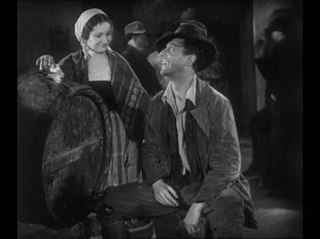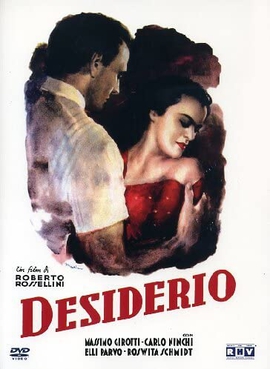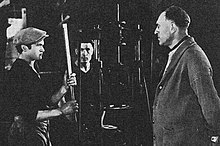
Alessandro Blasetti was an Italian film director and screenwriter who influenced Italian neorealism with the film Quattro passi fra le nuvole. Blasetti was one of the leading figures in Italian cinema during the Fascist era. He is sometimes known as the "father of Italian cinema" because of his role in reviving the struggling industry in the late 1920s.
Ivo Perilli was an Italian screenwriter. He wrote for more than 50 films between 1933 and 1977.

Odessa in Flames is a 1942 Italian-Romanian propaganda war film directed by Carmine Gallone and starring Maria Cebotari, Carlo Ninchi and Filippo Scelzo. The film is about the Battle of Odessa in 1941, where the city was taken in an operation was primarily conducted by Romanian forces and elements of the German Army's 11th Army.

Sun is a 1929 Italian silent drama film directed by Alessandro Blasetti and starring Marcello Spada, Vasco Creti and Dria Paola. The film was set around the planned draining of the Pontine Marshes by Benito Mussolini's Fascist government. It was shot partly on location, which added a sense of realism. Mussolini was impressed by the result and described it as "the dawn of the Fascist film".

Dria Paola (1909–1993) was an Italian stage and film actress. She played the female lead in Alessandro Blasetti's late silent Sun (1929). In 1930 she starred in the first Italian sound film The Song of Love.
Massimo Terzano was an Italian cinematographer. Terzano was a leading figure in the Italian film industry, working on over eighty films during the silent, Fascist and post-war eras. His final film was The Barber of Seville, made shortly before his death.

Alfredo Varelli was an Italian film actor whose career spanned more than six decades. Varelli was born Alfredo Ciavarella and debuted in Alessandro Blasetti's 1934 film Vecchia guardia. He emerged during the Fascist era, but most of his work was post-Second World War. He played a leading role in the 1942 historical drama The Jester's Supper. Varelli is also known for playing "Lucan" in Quo Vadis (1951). His last role was in the film Roseanna's Grave (1997).

Under the Southern Cross is a 1938 Italian drama film directed by Guido Brignone and starring Antonio Centa, Doris Duranti and Enrico Glori. The film is set in Italian-occupied Abyssinia following the recent Italian victory there. It was one of a sequence of eight films set in Italy's African Empire during the Fascist era that were released between 1936 and 1939. The film is a propaganda piece designed to support Fascist policy on empire and concerns about inter-racial romances.
The Charmer is a 1931 Italian comedy film directed by Guido Brignone and starring Armando Falconi, Tina Lattanzi and Ada Dondini. It is part of the White Telephone genre of films. It was shot at the Cines Studios in Rome.

Seconda B is a 1934 Italian comedy film directed by Goffredo Alessandrini and starring Sergio Tofano, Dina Perbellini and María Denis. It was screened at the Venice Film Festival where it was awarded a prize. It started a trend for "schoolgirl comedies" during the Fascist era, targeted primarily at girls and young women audiences. The title itself refers to a school class. The film is set in the early 1910s.
The Telephone Operator is a 1932 Italian comedy film directed by Nunzio Malasomma and starring Isa Pola, Mimì Aylmer and Luigi Cimara. It was a remake of the German film Wrong Number, Miss, released the same year.

Mother Earth is a 1931 Italian drama film directed by Alessandro Blasetti and starring Leda Gloria, Sandro Salvini and Isa Pola. It was made at the Cines Studios in Rome. Along with Blasetti's other early films, it shows a strong influence of Soviet-style realism. A country landowner decides to sell up and move to the city, but later has a change of heart. It was part of Fascist Italy's promotion of rural over urban values.

Stefano Pittaluga was an Italian film producer, one of several figures who helped revive Italian film production in the late 1920s and early 1930s.

The Innkeeper is a 1944 Italian historical comedy film directed by Luigi Chiarini and starring Luisa Ferida, Armando Falconi and Osvaldo Valenti. The film is an adaptation of Carlo Goldoni's 1753 play The Mistress of the Inn, one of a number of times the work has been turned into films. It belongs to the movies of the calligrafismo style.
Tortured Soul is a 1919 Italian silent film directed by Mario Caserini and starring Maria Jacobini, Andrea Habay and Alberto Collo. Alessandro Blasetti, a leading Italian director of the Fascist era, had his first contact with filmmaking by appearing as an extra.

The Materassi Sisters is a 1944 Italian comedy film directed by Ferdinando Maria Poggioli and starring Emma Gramatica, Irma Gramatica and Olga Solbelli. The film is an adaptation of the 1934 novel of the same title by Aldo Palazzeschi. It was shot at the Cinecittà Studios in Rome.

The Società Italiana Cines is a film company specializing in production and distribution of films. The company was founded on 1 April 1906.

The Peddler and the Lady is a 1943 Italian comedy film directed by Mario Bonnard and starring Aldo Fabrizi, Caterina Boratto and Anna Magnani.

Ente Nazionale Industrie Cinematografiche (ENIC) was an Italian film production and distribution entity that operated between 1935 and 1956.

Desire is a 1946 Italian drama film directed by Marcello Pagliero and Roberto Rossellini and starring Massimo Girotti, Elli Parvo and Carlo Ninchi.















